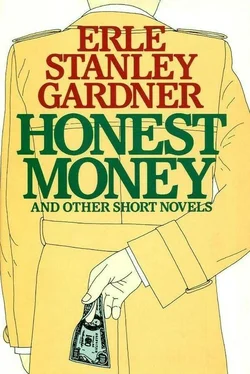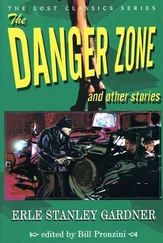Ken Corning continued to run, and Helen Vail flung herself from the automobile, gathered her ragged skirts about her, and sprinted after him.
The front door of Harrison Burman’s residence opened. A woman rushed out of the house, leaving the door open. She headed down the steps, apparently running in blind panic, and without seeing the two figures who were coming up the granite stairs which led to the front porch.
Ken Corning flung out his arms and caught her in midflight, swinging her around and holding her, despite frantically beating hands and kicking feet.
Abruptly the woman ceased to struggle and stared at Ken Corning with eyes that were wide and round, a face that was white as chalk.
“You!” she exclaimed.
“Mrs. Bixel,” Corning said, “tell me quickly — what happened?”
She stared at him for a moment in wordless tension, as though she had great difficulty in readjusting herself to the outer world. Then she said: “Harrison Burman shot himself.”
“Any servants?” asked Corning.
She shook her head, tried to say something and, instead, made only a throaty noise.
Corning turned to Helen Vail. She answered his unspoken question with a nod. Together, they piloted the woman down the stairs and into the automobile.
“You’re sure he’s dead?” asked Corning.
She nodded, wordlessly.
“Did he leave any confession, or anything that would incriminate you, in connection with shooting your husband in that cabin?”
She stared at Corning with alarm manifest in her eyes.
“You’re among friends,” Corning told her.
“No,” she said, in a low voice. “There was no confession; no writing.”
Ken Corning drove her to his office. Together, he and Helen Vail quieted her and gave her coffee mixed with brandy. Later they drove her to her home.
It was twenty-four hours later that Ken Corning called The Courier and got Jerry Bigelow on the line.
“You’re always anxious for the real inside dope, Bigelow,” he said, “and I just wanted to mention that if you thought the public would be interested in the real inside facts surrounding the suicide of Harrison Burman, they would be able to hear them when the evidence is brought out in Sam Driver’s trial.”
“Now just what does that mean?” asked the columnist, in a cool voice.
“It means just what I said,” Corning remarked. “It means that I know the identity of the man called Green, who was murdered. It means that I know how he met his death. It means that I know what happened up in that cabin in the mountains when Bixel was killed.”
“And you mean that will come out at the trial?” asked Bigelow.
“It will come out at the trial.”
“If there isn’t any trial will it come out?”
“If there is no trial,” said Ken Corning, speaking slowly and distinctly, “the facts will never be known — that is, the real facts.”
And he slid the receiver back on the hook.
Next morning, when he read his paper, he noticed with satisfaction that Jerry Bigelow, in his column given to gossip of the town, and the inside facts back of many of the political moves, made a prediction that the case against Sam Driver, accused of the murder of Harry Green, would be dismissed; that the District Attorney had relied upon circumstantial evidence which had not worked out exactly as anticipated. The columnist predicted as “hot inside stuff” that a dismissal of the case was contemplated.
Ken Corning carried the newspaper to his office, slid it over to Helen Vail.
“I saw it already, chief,” she said. “What does it mean?”
Ken Corning grinned at her.
“It means,” he said, “that the widow of Harrison Burman is in charge of the policies of the paper, and, therefore, has a great deal to say about the political activities of York City. It also means that we haven’t, as yet, discovered who the gentleman was that helped Harrison Burman put the body of Harry Green in the automobile belonging to Sam Driver.”
She looked at him with sudden consternation.
“You mean to say it was Jerry Bigelow...”
Ken Corning shrugged his shoulders and walked on to his inside office. From the door he called back to her: “Never speculate about a closed case. There is always a live one coming along that will keep us busy.”
And then the door softly closed and the latch clicked.












